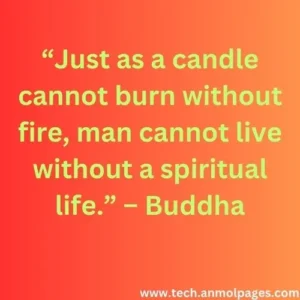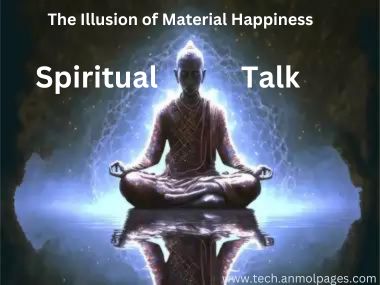The Illusion of Material Happiness-
I see plenty of happy people who aren’t spiritual. How do you explain that? | The Illusion of Material Happiness
Because the fire of knowledge is not burning in our minds, we accept material existence as happiness. A dog or hog cannot understand the kind of miserable life they are leading. They actually think they are enjoying life, and this is due to the covering or illusive influence of material energy. We may be in a miserable condition, but we accept it, thinking we are very happy. This is called ignorance.

You May Also Like This- Redesigning Life Goals for True Happiness | Motivational speech
When one awakens to knowledge, they realize, “Oh, I am not happy. I want freedom, but there is no freedom. I don’t want to die, but there is death. I don’t want to grow old, but there is old age. I don’t want diseases, but there are diseases.” These are the major problems of human existence, but we ignore them and focus on solving very minor problems.
We consider economic development to be the most important thing, forgetting how long we shall live here in this material world. Economic development or not, at the end of sixty or a hundred years, our life will be finished. Even if we accumulate a million dollars, we must leave it all behind when we leave this body.
You May Also Like This- Left ear ringing spiritual meaning | Right ear ringing spiritual meaning
We need to understand that in the material world, whatever we are doing is being defeated by the influence of material nature. We chase after wealth, status, and temporary pleasures, overlooking the transient nature of our existence. True wisdom lies in recognizing the ephemeral quality of material gains and striving for a deeper, spiritual fulfillment. Only then can we transcend the illusions of this world and achieve lasting peace and happiness.
Are you saying material happiness is not real happiness?
Every one of us is searching for happiness, but we do not know what real happiness is. We see so much advertised about happiness, but practically speaking, we see so few happy people. This is because so few people know that the platform of real happiness is beyond temporary things. It is this real happiness that is described in the Bhagavad Gita by Lord Krishna to Arjuna.
You May Also Like This- St patrick’s day spiritual meaning

To cite an example I have given many times, if you take a fish out of water, you can give it a very comfortable velvet bedstead, but still, the fish will not be happy; it will die. Because the fish is an animal of the water, it cannot be happy without water. Similarly, we are all spirit souls. Unless we are in spiritual life or in the spiritual world, we cannot be happy; that is our position.
Temporary pleasures and material possessions may offer fleeting moments of satisfaction, but they cannot provide the deep, lasting happiness that our souls crave. Just as the fish needs water to thrive, we need to be connected to our spiritual essence to find true fulfillment. This spiritual connection goes beyond the physical and material dimensions, reaching into the core of our being.
You May Also Like This- Spiritual Awakening | Who am I?
Real happiness is found in understanding our true nature and aligning ourselves with it. It involves cultivating inner peace, love, and a sense of purpose that transcends the superficial and ephemeral. By seeking spiritual growth and wisdom, we can discover a profound joy that is not subject to the ups and downs of worldly life. This is the ultimate message of the Bhagavad Gita and the key to unlocking the happiness we all seek.

But what if I am satisfied with my standard of happiness?
If one were to ask a tree, “Are you feeling happy?” the tree, if it could, might say, “Yes, I am happy standing here all year. I’m enjoying the wind and snowfall very much.” This may be enjoyable for the tree, but for a human being, it is a very low standard of enjoyment. There are different kinds and grades of living entities, and their conceptions and perceptions of happiness also vary in types and grades.
For instance, an animal may see another animal being slaughtered, yet it will continue chewing grass, unaware that it may be next. It thinks it is happy, but in the next moment, it might be slaughtered. Thus, there are different degrees of happiness, but what is the highest form of happiness? Shri Krishna tells Arjuna in the Bhagavad Gita (6.21): “In that joyous state (samadhi), one is situated in boundless transcendental happiness and enjoys himself through transcendental senses. Being established in such a position, one never departs from the truth.”
In a desert, there is no water, but a foolish deer runs after the mirage, thinking it is water. The water is not unreal, but the place where we see it is misleading. The advancement of materialistic civilization is just like a mirage in the desert. The deer runs after the water in the desert with full speed, and the illusion of water moves ahead at the same speed as the foolish deer. The water is not false, but we must not seek it in the desert.
Living entities, by their past experience, remember the real happiness of their original spiritual existence. However, since they have forgotten their spiritual nature, they seek permanent happiness in material things, though this is impossible. Every experience in the material world is mixed with pain and pleasure. Can there be any pain without pleasure, and can our pleasure be shared?
If we use this standard to test material happiness, we will understand that there is no true happiness. This test shows it is impossible to achieve lasting happiness in the material world. True and lasting happiness lies beyond the transient and illusory nature of material existence, in the realm of spiritual realization.
You May Also Like This:- Mantra for Progress: The Three Biggest Obstacles to Success
